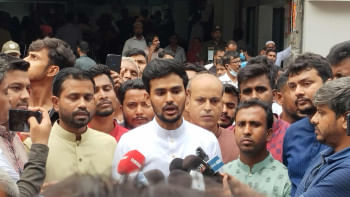'Sinful Saakashvili' or hero?
ONE of the more lingering images from the Georgia crisis may be footage of Georgian President Mikheil Saakashvili's bodyguards throwing him to the ground and covering him with flak jackets as a Russian jet zoomed above. Witnessed by journalists from Newsweek and other outlets on Monday morning in Gori, the incident signified the seeming powerlessness of Georgia in the face of Russian military might.
Saakashvili was in Gori, a city of about 35,000 people 45 miles from the Georgian capital, Tbilisi, to inspect ruined buildings; their facades scorched black, their windows blown out and their balconies shredded.
In one of the burnt-out cars on the street, a pregnant woman and her husband had been killed by a bomb just hours before. He brought along French Foreign Minister Bernard Kouchner, who told reporters that he had come to show the world "a strong picture" of what happened to a few blocks of a city in a sovereign country.
Saakashvili was angry. When asked how the war with Russia could be stopped, he snapped: "Ask our neighbours!" The next moment, the low roar of that jet caused a panic. One of Saakashvili's bodyguards, a stout man with a camouflage scarf around his head, screamed and pointed at the sky. "Khairy, Khairy!" he shouted. "The air! The air!"
Kouchner, who unlike the Georgian president was not wearing a flak jacket, was already in his car, leaving the street at top speed. When the jet was gone, the president was rushed to his car and driven away. Saakashvili's Hummer made such sharp turns that it seemed in danger of turning over.
Not all the locals were impressed by the president's visit. A block away, two middle-aged women were crying by their ruined house. "What is he here for?" they said of Saakashvili. "What is he worth now? Can he give us our houses back?"
News of the Russian Army's rapid advance Monday came by radio and text message: Russian tanks are in Poti, said the Georgian government; they drove through Zugdidi to the military base in Senaki, according to a reporter who saw tanks and spoke to Russian soldiers; they have taken Brotskheti, the third village past the former South Ossetian border on the way to Gori, a NEWSWEEK colleague reported.
Meanwhile, Russian television carried Russian Deputy Prime Minister Sergey Ivanov's statement that Russian forces were taking control only of the "conflict zones" in Georgia, with no designs on the country as a whole. Do not worry, he said, his message addressed to the West and heavy with irony, "We are not going to destroy your beacon of democracy."
At exactly the same time, Russian aviation was bombing the outskirts of Gori. Photographer Don Weber was close enough to feel the hot blast burning his skin.
After the Georgian army retreated from Gori to the medieval citadel of Mtskheta, about 25 miles away from the capital, Saakashvili told the nation on television Monday night that the Russians "are coming … Mtskheta is our last position to defend the capital." His words created panic all across Tbilisi.
Across the street from the parliament building on Rustaveli Prospect, the central street of Tbilisi, a man was sitting on the pavement in tears as his 2-year-old son hugged his father's head.
Gocha Kalichava, 29, said he lost his wife Sofika, his mother Lyudmila and baby son Edik in the Russian bombings of Gori. "I do not care what commands Putin gives," he cried. "Why did our president go on the attack?" he asked referring to Saakashvili's initial move on South Ossetia last week. "Russia has won wars for centuries. Did [Saakashvili] think tiny Georgia could survive attacks? He must have been out of his mind!"
Maria Shishianishvili was selling cola on the side of the road on the same street. "Let the Russians come as soon as they can and bring down this sinful Saakashvili!" she fumed. "We'll welcome them."
The scene was admittedly different in Tbilisi on Tuesday evening when thousands of flag-waving Georgians turned out to hear a defiant Saakashvili address the crowd. "I saw Russian planes bombing our villages and killing our soldiers, but I could not do anything, and this will always be with me," he said. "I promise that I will make them regret this."
Saakashvili was joined on stage by the leaders of five countries who have also had problems with their Russian neighbour: Ukraine, Poland, Lithuania, Latvia and Estonia.
But Lyudmila Agishvili, 60, has witnessed revolutions and thousands of protestors marching by her window. "We have already experienced Russian tanks on Rustaveli," she said, remembering April 9, 1989, when Soviet tanks dispersed independence demonstrators.
Agishvili said that she panics when she imagines that tonight or tomorrow Russian tanks could be driving on her street again. "It has been awfully scary. When the president ordered to attack Tskhinvali [the capital of South Ossetia], we knew then we were doomed. How come he didn't realise that?"
©Newsweek International. All rights reserved. Reprinted by arrangement.

 For all latest news, follow The Daily Star's Google News channel.
For all latest news, follow The Daily Star's Google News channel. 



Comments